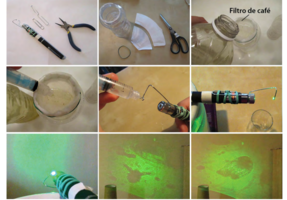Recursos digitais para o ensino: análise de critérios de avaliação e projeto de um aplicativo sobre o Aedes aegypti
Em 2013, avaliadores do Programa Nacional do Livro Didático (PNLD) relataram que muitos recursos digitais complementares aos livros didáticos de Ciências foram reprovados por não cumprirem os critérios do edital do programa. Com o auxílio de exemplos reais, são analisados três destes critérios e é apresentada uma lista de recomendações para o desenvolvimento de recursos digitais para o ensino. Esta lista inclui sugestões como a de: promover a aprendizagem significativa, a experimentação e a participação ativa dos estudantes no processo de aprendizagem; fornecer guias de orientação didática para os professores; tornar o funcionamento da interface intuitivo, evitando numerosas instruções de uso; fornecer feedback da interação e levar em consideração as principais etapas da investigação científica no caso de objetos para ensino de Ciências. Com base nestas recomendações, projetou-se um aplicativo para computador/ web e dispositivos móveis direcionado a estudantes de Ensino Fundamental do 6º ao 8º ano. A partir do aplicativo, os estudantes aprenderiam a mitigar riscos relacionados ao mosquito Aedes aegypti, alterando fatores ambientais relevantes para o desenvolvimento das larvas desta espécie. Vale notar que as medidas mais eficazes de controle ao A. aegypti são direcionadas à fase larval dos mosquitos. A relevância do tema evidencia-se pela ocorrência de mais de 1.5 milhão de casos de dengue registrados no Brasil em 2015 e pela recente epidemia de zika.
In 2013, evaluators of the Brazilian Textbook Program reported that many digital tools to be added to Science textbooks were rejected for not meeting the criteria established at the program s announcement. With the aid of real-world examples, three of these criteria are analyzed and a list of recommendations for the design of digital learning tools is presented, including recommendations such as: to promote meaningful learning, experimentation and the active participation of students; to present didactic guidelines for teachers; to create an intuitive interface, avoiding the use of many instructions; to provide feedback and to take into consideration the main steps of scientific inquiry in the case of learning objects for Sciences. Based on these recommendations, a desktop/web and mobile application for students from 6th to 8th grade was designed. Through the use of the application, students would learn how to mitigate risks related to the Aedes aegypti mosquito, by manipulating environmental factors that affect the development of its larvae. Interventions targeting the larval stage are the most effective kind of control of the mosquito. Relevance of the subject is attested by more than 1.5 million cases of Dengue fever reported in Brazil in 2015 and the recent Zika fever outbreak.
Em 2013, avaliadores do Programa Nacional do Livro Didático (PNLD) relataram que muitos recursos digitais complementares aos livros didáticos de Ciências foram reprovados por não cumprirem os critérios do edital do programa. Com o auxílio de exemplos reais, são analisados três destes critérios e é apresentada uma lista de recomendações para o desenvolvimento de recursos digitais para o ensino. Esta lista inclui sugestões como a de: promover a aprendizagem significativa, a experimentação e a participação ativa dos estudantes no processo de aprendizagem; fornecer guias de orientação didática para os professores; tornar o funcionamento da interface intuitivo, evitando numerosas instruções de uso; fornecer feedback da interação e levar em consideração as principais etapas da investigação científica – no caso de objetos para ensino de Ciências. Com base nestas recomendações, projetou-se um aplicativo para computador/ web e dispositivos móveis direcionado a estudantes de Ensino Fundamental do 6º ao 8º ano. A partir do aplicativo, os estudantes aprenderiam a mitigar riscos relacionados ao mosquito Aedes aegypti, alterando fatores ambientais relevantes para o desenvolvimento das larvas desta espécie. Vale notar que as medidas mais eficazes de controle ao A. aegypti são direcionadas à fase larval dos mosquitos. A relevância do tema evidencia-se pela ocorrência de mais de 1.5 milhão de casos de dengue registrados no Brasil em 2015 e pela recente epidemia de zika.
